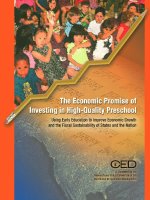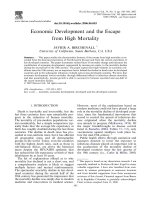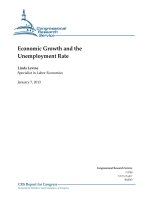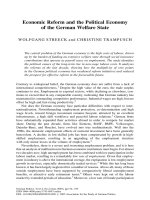Rosefielde mills global economic turmoil and the public good (2015)
Bạn đang xem bản rút gọn của tài liệu. Xem và tải ngay bản đầy đủ của tài liệu tại đây (1.54 MB, 224 trang )
AND
THE
9110_9789814590501_tp .indd 1
GLOBAL
ECONOMIC
TURMOIL
PUBLIC GOOD
4/3/15 9:53 am
May 2, 2013
14:6
BC: 8831 - Probability and Statistical Theory
This page intentionally left blank
PST˙ws
AND
THE
GLOBAL
ECONOMIC
TURMOIL
PUBLIC GOOD
Steven Rosefielde
University of North Carolina, USA
Daniel Quinn Mills
Harvard Business School, USA
World Scientific
NEW JERSEY
•
LONDON
9110_9789814590501_tp .indd 2
•
SINGAPORE
•
BEIJING
•
SHANGHAI
•
HONG KONG
•
TA I P E I
•
CHENNAI
4/3/15 9:53 am
Published by
World Scientific Publishing Co. Pte. Ltd.
5 Toh Tuck Link, Singapore 596224
USA office: 27 Warren Street, Suite 401-402, Hackensack, NJ 07601
UK office: 57 Shelton Street, Covent Garden, London WC2H 9HE
Library of Congress Cataloging-in-Publication Data
Rosefielde, Steven.
Global economic turmoil and the public good / by Steven Rosefielde (University of North
Carolina, USA) & D. Quinn Mills (Harvard Business School, USA).
pages cm
Includes bibliographical references.
ISBN 978-9814590501
1. Global Financial Crisis, 2008–2009. 2. Economic policy. 3. Economic development.
4. Finance, Public. I. Mills, Daniel Quinn. II. Title.
HB37172008 .R67 2015
330.9'0511--dc23
2014037409
British Library Cataloguing-in-Publication Data
A catalogue record for this book is available from the British Library.
Copyright © 2015 by World Scientific Publishing Co. Pte. Ltd.
All rights reserved. This book, or parts thereof, may not be reproduced in any form or by any means,
electronic or mechanical, including photocopying, recording or any information storage and retrieval
system now known or to be invented, without written permission from the publisher.
For photocopying of material in this volume, please pay a copying fee through the Copyright Clearance
Center, Inc., 222 Rosewood Drive, Danvers, MA 01923, USA. In this case permission to photocopy
is not required from the publisher.
In-house Editors: Dipasri Sardar/Philly Lim
Typeset by Stallion Press
Email:
Printed in Singapore
Dipa - Global economic turmoil.indd 1
10/2/2015 3:40:25 PM
b1962 Global Economic Turmoil and the Public Good
9x6
For David Rosefielde
b1962_FM.indd v
21-04-2015 09:02:26
May 2, 2013
14:6
BC: 8831 - Probability and Statistical Theory
This page intentionally left blank
PST˙ws
b1962 Global Economic Turmoil and the Public Good
9x6
Table of Contents
Executive Summary
Preface
Foreword
Acknowledgments
ix
xi
xiii
xv
Part I Global Economic Turmoil
1
Chapter 1
Playing with Fire
3
Chapter 2
Ignoring Today’s Dangers
11
Chapter 3
Insider Democracy
37
Chapter 4
Squeezing the Middle Class
57
Chapter 5
Liberalization for the Privileged
69
Chapter 6
East–West Polarization
87
Chapter 7
Degeneration, Crisis and Disorder
91
Part II Obstacles to Crisis Prevention
95
Chapter 8
Words Instead of Action
97
Chapter 9
Treadmill of Regulation
107
Chapter 10 Macroeconomic Miasma
127
Chapter 11 Dogmatism
137
vii
b1962_FM.indd vii
21-04-2015 09:02:27
b1962 Global Economic Turmoil and the Public Good
viii
9x6
Table of Contents
Chapter 12 Pipe Dreams
141
Chapter 13 Doublethink
145
Part III Framework for Sustainable Prosperity
149
Chapter 14 The Importance of Inclusive Economic Theory
151
Chapter 15 Breaking Vicious Cycles
155
Chapter 16 Lesser Evil
163
Chapter 17 Prospects
173
Conclusion
179
Bibliography
183
Index
191
b1962_FM.indd viii
21-04-2015 10:32:45
b1962 Global Economic Turmoil and the Public Good
9x6
Executive Summary
The promise of global economic liberalization has given way to a crisisprone, economically stagnant, politically fragile new world order. The origins of the problems of economic crisis, stagnation, ballooning inequality,
middle class affliction and global polarization lie in the political system —
they are not primarily economic. It follows that the route to avoiding future
financial crises and to restoring economic growth lies in preventing politicians from riding roughshod over prudent economic policy.
The challenge posed by secular stagnation, crises, decay and discord
today cannot be adequately understood in traditional terms. The main
driver is insider globalization; that is, the worldwide quest by national
establishments and their various allies to maximize rewards for themselves
derived from government programs, corruption, self-serving regulation,
over-taxation, fiscal leverage, credit expansion, liberalization, supranationalization and emergent world government.
Globalization on western terms is dead. Russia, China and various
nations of the Middle East have been afforded a major opportunity to
bend the global power balance their way with multiple instruments
including military force, flouting the START arm control agreement,
subversion, intimidation, market power and “enlightened conservative”
authoritarian ideologies. The resulting struggle for hegemony will exacerbate the gathering economic storm.
ix
b1962_FM.indd ix
21-04-2015 09:02:27
b1962 Global Economic Turmoil and the Public Good
x
9x6
Executive Summary
There are no easy fixes to the increasing turmoil into which the world
is falling because the advocacy of the public good by entrenched politicians and government administrators is hypocritical. Miracles should not
be expected. Nonetheless, a different and more effective path is available
if democratic publics begin to appreciate the present danger. The people
can take direct action to reclaim their sovereignty. They can devise strategies for constraining the rapacity of insiders, including those set forward
in this book, and clip the wings of their “public servants”.
b1962_FM.indd x
21-04-2015 09:02:27
b1962 Global Economic Turmoil and the Public Good
9x6
Preface*
This volume develops, expands and synthesizes themes previously
addressed by the authors in Master of Illusion (Cambridge University
Press, 2007), Prevention and Crisis Management (World Scientific, 2012),
Democracy and its Elected Enemies (Cambridge University Press, 2013),
and Inclusive Economic Theory (World Scientific, 2014). It stresses the
adverse role of state actors in economic and international affairs as is
often done in political science, but does so more rigorously with the aid of
inclusive economic theory.
The integration of market and government within a unified framework makes it plain that governments today are the primary source of
mounting global economic turmoil, not the solution as officials tirelessly
claim.
* Our view is gradually becoming main stream. See Fukuyama, Francis (2014), “America
in Decay: The Sources of Political Dysfunction,” Foreign Affairs, September/October.
Available at Cf. Economic Conditions Snapshot, September 2014: McKinsey Global Survey results,
September 2014. Available at />Economic_Conditions_Snapshot_September_2014_McKinsey_Global_Survey_results?
cid=other-eml-alt-mip-mck-oth-1409: “After identifying geopolitical instability as a top
risk to global growth for three successive surveys, executives now also cite it most often as
a threat to both near- and long-term growth in their own economies. In fact, since we first
asked about geopolitical risk, the threat it poses to economic growth has hit record levels
in McKinsey’s newest survey on economic conditions.”
xi
b1962_FM.indd xi
21-04-2015 09:02:27
b1962 Global Economic Turmoil and the Public Good
9x6
xii Preface
Economics as Alexander Rosenberg correctly argues is not a comprehensively testable science.1 Data are often unreliable and dis-informative.
Theories are fuzzy, and cannot be repeatedly verified under laboratory
conditions. Propaganda often compels analysts to operate in a “wilderness
of mirrors”.2 Inclusive economic theory does not obviate these deficiencies.
However, by integrating neoclassical and neo-realist theories, it provides
a superior tool for discerning what Karl Popper calls “truthlike
verisimilitude”.3 The method is an advanced form of Popper’s “critical
rationality”, and is vastly more powerful than rival contemporary economic
methodologies.
Combining inclusive economics with political science we are able to
lucidly describe the increasing disruption of the global economy which is
occurring today, its causes and potential cures.
In this book we make predictions. In earlier books we have made predictions also. We are generally right. Many commentators and pundits
make predictions that are wrong. This is because those people are generally engaged in wishful thinking — they insist that people, corporations
and nations are better than they really are. Their predictions are exercises
in romantic illusions. Such predictions do not come true. In contrast, we
are neorealists. We do not expect the world to be better than it shows itself
to be. Hence, our predictions are most often correct.
1
Rosenberg, Alexander (1994), Mathematic Politics or Science of Diminishing Returns, Chicago:
University of Chicago Press. “None of our models of science really fit economics at all”.
2
Martin, David (2003), Wilderness of Mirrors: Intrigue, Deception and the Secrets That
Destroyed Two of the Cold War’s Most Important Agents, New York: Lyons Press.
3
Popper, Karl (1985), The Open Society and Its Enemies, New York: Harper & Row. Popper,
Karl (1985), “The Rationality Principle”, in David Miller, ed., Popper Selections, Princeton:
Princeton University Press.
b1962_FM.indd xii
21-04-2015 09:02:27
b1962 Global Economic Turmoil and the Public Good
9x6
Foreword
Commentators and social scientists have broken up our times into parts;
they have not tried to fit the parts together; so that our task is substantial.
Combining domestic politics, economics and international relations into
one coherent story is critical to a full understanding of our future. We have
made the attempt.
xiii
b1962_FM.indd xiii
21-04-2015 09:02:27
May 2, 2013
14:6
BC: 8831 - Probability and Statistical Theory
This page intentionally left blank
PST˙ws
b1962 Global Economic Turmoil and the Public Good
9x6
Acknowledgments
The scope of Global Economic Turmoil and the Public Good is too large to
permit us to thank all those who have contributed to its development, but
special thanks is due to Wenting Ma for her invaluable research assistance.
Susan Rosefielde gave her unstinting support.
Steven S. Rosefielde
Thanks to Jefferson Flanders for many discussions which helped me understand these topics. Thanks also to the Research Division of the Harvard
Business School for financial support of research on which this book is
partially based.
D. Quinn Mills
xv
b1962_FM.indd xv
21-04-2015 09:02:27
May 2, 2013
14:6
BC: 8831 - Probability and Statistical Theory
This page intentionally left blank
PST˙ws
b1962 Global Economic Turmoil and the Public Good
9x6
Part I
Global Economic Turmoil
b1962_Ch-01.indd 1
21-04-2015 08:52:07
May 2, 2013
14:6
BC: 8831 - Probability and Statistical Theory
This page intentionally left blank
PST˙ws
b1962 Global Economic Turmoil and the Public Good
Chapter
9x6
1
Playing with Fire
The reader will “have to make up his mind, whether he wants simple
answers to his questions, or useful ones — in this as in other economic
matters he cannot have both”. Joseph A. Schumpeter, Sophus A. Reinert,
(interview with Sean Silverthorne), “The Forgotten Book that Helped Shape
the Modern Economy”, Working Knowledge, Harvard Business School,
November 7, 2011. />
The global economy is becoming increasingly turbulent. Another and more
virulent version of the financial crisis is likely, although many vainly hope
that if the Federal Reserve can keep interest rates down we will muddle
through. Much can be done to prevent another catastrophic financial crisis
but probably will not. The key reason for inaction is that political and economic leaders insist that the current economic situation is for the public
good. It is not.
The 2008 global financial crisis was supposed to quickstep into a
V-shaped recovery and morph thereafter into a protracted period of
vibrant global economic growth.1 The V-shaped recovery did not happen.
Instead, seven years after the crisis hit, economic activity in parts of
the European Union (EU) remains depressed,2 post-recovery growth in
1
“Velocity and the V-shaped Recovery”, Forbes, October 21, 2008. Retrieved from http://www.
forbes.com/2008/10/20/money-recession-recovery-oped-cx_bw_rs_1021wesburystein.html.
2
“IMF cuts eurozone 2014 growth forecast”, July 14, 2014. Retrieved from http://news.
yahoo.com/imf-cuts-eurozone-2014-growth-forecast-223727218.html.
3
b1962_Ch-01.indd 3
21-04-2015 08:52:07
b1962 Global Economic Turmoil and the Public Good
4
9x6
Global Economic Turmoil and the Public Good
America has been anemic, and concern is mounting about a fresh financial
crisis.3 The BRICS (Brazil, Russia, India, China and South Africa) briefly
defied economic gravity, but most eventually succumbed to its downward
pull.4 Russia and Brazil crashed, and growth retardation has beset the rest
of the miracle club, including China. Brighter days are constantly heralded,
but there are sound reasons for skepticism.5
These dispiriting results have been brought about by intensifying the
excesses which precipitated the 2008 global financial crisis in the first
place. Sovereign indebtedness continues to steadily mount,6 and
“bubbling” — creating asset price bubbles via low interest rates and
excessive monetary ease — has become the accepted policy elixir for
3
Mirhaydari, Anthony (2014), “Is the Eurozone’s Debt Crisis Set to Reignite?” Money Watch
(July 10). Retrieved from “Markets were volatile Thursday, with the Russell 2000 flirting with losses for
the year on fresh concerns over the health of the Portuguese banking system”. This comes
after trading in shares of Portugal’s largest bank, Banco Espirito Santo, were halted in the
European session after tumbling 19%.
4
Korhonen, Iikka; Fidrmuc, Jarko and Batorova, Ivana (2012), “Business-cycle Decoupling”,
in Steven Rosefielde, Masaaki Kuboniwa and Satoshi Mizobata, eds., Two Asias: The
Emerging Postcrisis Divide, Singapore: World Scientific, pp. 345–358.
5
Lachman, Desmond (2014), “Seeking Alpha ‘The Euro Crisis, Part 2’?” AEI (May 21).
Retrieved from />U484zySYFWc.email. “Judging by the increasingly upbeat statements of European policymakers and the currently buoyant market pricing of eurozone sovereign bonds, one could
be forgiven for thinking that the euro crisis is now finally behind us. However, to do so
would be to ignore a whole slew of underlying economic and political indicators that
would suggest a very different story. Those indicators would suggest that at best we are in
the phony-war stage of the crisis and that it is only a matter of time before that crisis
returns with greater virulence than before. Among the more basic indicators to which the
market is paying scant attention is the fact that eurozone public debt levels remain
extraordinarily high and are yet to show any clear signs of declining. The public sector
sovereign debt to gross domestic product (GDP) level is now as high as 175% in Greece,
133% in Italy, and around 125% in Ireland and Portugal. Making these debt levels all the
more troubling is the fact that all of these countries are now showing the clearest signs of
austerity fatigue and the lack of political willingness to generate primary budget surpluses
of a size sufficient to place those debt ratios on a declining path”.
6
Johnson, Simon and Kwak, James (2012), White House Burning: The Founding Fathers,
National Debt and What it Means to You, New York NY: Vintage.
b1962_Ch-01.indd 4
21-04-2015 08:52:07
b1962 Global Economic Turmoil and the Public Good
9x6
Playing with Fire 5
accelerating global economic growth. Leaders everywhere are disregarding the handwriting on the wall — economic turmoil ahead — gambling
that they personally and their nations will prevail7; hoping against hope
that there will be stability, prosperity, robust growth and international
tranquility in our time.8 These hopes are going to be dashed for most
people, unless there is a swift change of attitude and policy. 9
How can this be? It has been an axiom of faith for at least a quarter of
a millennium that people are “rational”; that reason governs individual
and governmental behavior about the problems we face and decisions
about how to deal with them. Does not it follow that if wrong decisions
are sometimes made, leaders should learn from their mistakes and avoid
repeating them? Likewise, should not advances in economic science,
information technologies, computerization and management have
diminished crisis risk and increased growth potential? Many pundits and
politicians tell us that this is the case.
It would be good if their assurances were trustworthy, but the record
indicates otherwise. Honest pundits, politicians and social scientists dismiss the dangers ahead because they have broken up our times into parts;
they have not tried to fit the parts together. This makes our task substantial.
Piecing domestic politics, economics and international relations into one
7
Reinhart, Carmen and Rogoff, Kenneth (2009), This Time Will be Different: Eight Centuries
of Financial Folly, Princeton NJ: Princeton University Press.
8
The British Prime Minister (PM) has been hailed as bringing “peace to Europe” after
signing a non-aggression pact with Germany. PM Neville Chamberlain arrived back in
the United Kingdom (UK) today, holding an agreement signed by Adolf Hitler which stated
the German leader’s desire never to go to war with Britain again. BBC, September 30, 1938.
Retrieved from news.bbc.co.uk/onthisday/hi/dates/stories/september/30/newsid_
3115000/3115476.stm.
9
“Yellen says Fed easy money needed even after recovery: Report”, Reuters, July 14, 2014.
Retrieved from “And so even when the headwinds have diminished to
the point where the economy is finally back on track and it’s where we want it to be, it’s still
going to require an unusually accommodative monetary policy”, she is quoted as saying in
the article that stresses Yellen’s role as public servant.
“I come from an intellectual tradition where public policy is important, it can make a
positive contribution, it’s our social obligation to do this”, she says in an online version of
the article. “We can help to make the world a better place”.
b1962_Ch-01.indd 5
21-04-2015 08:52:07
b1962 Global Economic Turmoil and the Public Good
6
9x6
Global Economic Turmoil and the Public Good
coherent story is critical to a full understanding of our future. Global
Economic Turmoil and the Public Good fills the gap. It plumbs the paradox of
“rational-doublethinking” (fragmented theory and “motivated blindness”)
to pinpoint what has gone wrong and to clarify why the future is becoming
increasingly perilous. It not only describes the danger of a mega global
financial crisis looming on the horizon and east–west polarization, but also
considers prospects for subsequent decay and social disorder. It documents
what has been done since 2008 to forestall financial turbulence and economic sclerosis; analyzes contemporary policies designed to spur accelerated
growth, and probes their inadequacies. Most importantly of all, it explains
why leaders driven by an indomitable will for personal wealth, privilege and
power,10 persistently do the wrong thing, and it shows how matters can be
rectified with the assistance of “inclusive economic theory”.11
Having Your Cake and Eating It12
The mega force driving the globe into economic turmoil is the conviction of
political insiders that they can have their cake and eat it too by persistently
increasing deficit spending and expanding credit. Once upon a time, it was
fashionable to counsel restrained government spending and financial
discipline, and to devise adjustment mechanisms to deal with prodigal
countries.13 But times have changed. Government insiders today across the
planet have convinced themselves individually and collectively that the best
10
Schopenhauer, Arthur (2010), The World as Will and Representation, Cambridge:
Cambridge University Press, Vol. 1. Magee, Bryan (1997), The Philosophy of Schopenhauer,
Oxford: Oxford University Press.
11
Rosefielde, Steven and Pfouts, Ralph W. (2014), Inclusive Economic Theory, Singapore:
World Scientific Publishers.
12
The proverb literally means “you cannot both possess your cake and eat it”. An early
recording of the phrase is in a letter on March 14, 1538 from Thomas, Duke of Norfolk to
Thomas Cromwell, as “a man cannot have his cake and eat his cake”. Letters and Papers,
Foreign and Domestic, Henry VIII, Vol. 13, Part 1, p. 189, Ref. 504.
13
This was the focus of the absorption approach in international macroeconomic theory.
See Haberler, Gottfried von (1976), “The Monetary Approach to the Balance of Payments”,
Journal of Economic Literature, Vol. 14, No. 4, pp. 1324–1328. Obstfeld, Maurice (2001),
“International Macroeconomics: Beyond the Mundell–Fleming Model”, IMF Staff Papers,
Vol. 47. Retrieved from />
b1962_Ch-01.indd 6
21-04-2015 08:52:07
b1962 Global Economic Turmoil and the Public Good
9x6
Playing with Fire 7
course of action for them is to do whatever they please (Schopenhauer’s will
to power), shifting the adjustment burden willy–nilly on to the shoulders of
their victims. They insist that all risks can be managed and whatever is good
for them is best for everyone else. The attitude is abetting a new Cold War
driven by the complementary delusion that insiders in the conduct of
international affairs likewise can have and simultaneously eat their cake,14
drawing economics and international relations into a common destructive
vortex detached from higher reason and ethics.
This book’s central thesis is that “having and eating your cake”
governments across the globe today led by self-seeking insiders and politicians (politocrats) acting under the cover of various political economic
ideals are the principal cause of secular stagnation and inequality, and the
growing threats of financial crises, decay, social discord and east–west
polarization. Governments are generating these disorders by riding roughshod over the competitive forces of supply and demand, and deflecting
blame by pointing fingers everywhere except at themselves. And they are
blowing smoke in everyone’s eyes by pretending that secular stagnation,
inequality, financial crises and international rivalries can be eliminated
with more refined neoclassical economic theories, better macroeconomic
policies and punitive economic measures (including sanctions imposed on
Russia) rather than remedying insider governmental abuses.15
Global Economic Turmoil exposes this doublethinking delusion, and
details the various ways government practices and policies need to be radically altered to assure global prosperity and tranquility. The book helps
readers confront the fact that government insiders and their private sector
“partners” improperly acting in their own interests are the primary cause
14
The Monitor’s View, “The US–Russia ‘great game’ over Ukraine”, April 1, 2014. Retrieved
from />15
One example of the mentality is reflected in the World Bank’s campaign to “share prosperity and mitigate poverty” assuming that government can achieve the goal without
significant adverse side effects. See “Shared Prosperity and the Mitigation of Poverty”,
World Bank Research Digest, Vol. 8, No. 2, Winter 2014. Jensen, Donald (2014), “Ukraine
Crisis: The US Pushes Back”, Institute of Modern Russia (April 3). Retrieved from http://
imrussia.org/en/russia-and-the-world/704-ukraine-crisis-the-us-pushes-back#.
U0Emg16z5w0.email.
b1962_Ch-01.indd 7
21-04-2015 08:52:08
b1962 Global Economic Turmoil and the Public Good
8
9x6
Global Economic Turmoil and the Public Good
of the planet’s contemporary economic and geopolitical woes,16 and that
fundamental solutions have to start with downsizing government and
disciplining self-seeking insiders.
The danger posed by politicians acting for themselves in association
with various interest groups at the people’s expense is skillfully camouflaged. In America unofficial spokesmen for the Democrat Party (and Wall
Street) like Larry Summers and Paul Krugman purportedly support
aggressive money creation, increased deficit spending and national debt to
fund egalitarian programs (rather than financial speculators) that they
claim are socially progressive, while the Republican Party portrays itself as
the advocate of free competition. This makes it appear that the electorate
has a clear choice when in fact both parties favor big insider government
and assistance to the rich. Both assiduously press for more government
stimulus albeit at slightly different levels, each striving to steer funds to its
preferred constituents. The dichotomy is not between social democracy
and democratic free enterprise. The “welfare” state is taken as given by
both sides. The dividing line is between Summers’s and Krugman’s
rhetorical support for aggressive macroeconomic stimulation targeted
toward “deserving minorities” (anti-austerity policy),17 and the Republican
Party’s preference for less macroeconomic stimulation coupled with
Laffer Curve-style business tax incentives and deregulation,18 and a
slightly lower tolerance for excessive national debt. This clash of caricature
philosophies dominates most of the media’s attention, diverting public
scrutiny from the important truth that over-regulation, excess stimulation
16
Former KGB head and Russian PM under Boris Yeltsin, Evgeny Primakov advocates Putin
increasing the role of command in Russia’s economy and curtailment of the market and
justifies the advocacy by pointing to developments in America. “Meanwhile, the US and EU
countries increased the influence of the state on the economy during the downturn, and this
trend is still continuing today”. Primakov, Yevgeny (2014), “Russia’s Problems: Why
Neoliberal Policy is Unacceptable Today”, (January 27). Retrieved from http://valdaiclub.
com/economy/66385.html#sendToFriendBox.
17
Weichenrieder, Alfons (2014), “Many European countries feel haunted by ‘excess austerity,’”
SAFE Newsletter Research & Policy Q1. Retrieved from />n4d,f=5,u=e1c384d46575b8202accb4e4dfa767e7,n=5s69i.j0kn4d,p=1,artref=3870407.
18
Laffer, Arthur (2004), “The Laffer Curve: Past, Present, and Future”, Heritage Foundation
(June 1). Retrieved from />
b1962_Ch-01.indd 8
21-04-2015 08:52:08









